

TL;DR - How much does WhatsApp API cost?
Businesses using the WhatsApp Business API should consider 3 main costs: Meta’s call and message fees, Business Solution Providers (BSPs) charges, and inbox or conversation management software fees.
Meta charges: Meta charges businesses for template messages and answered outgoing calls, with rates varying by country among other criteria.
BSP fees: Some BSPs charge extra for WhatsApp access, setup and hosting fees, as well as WhatsApp call or message markups.
Inbox fees: Subscription to an inbox or conversation management software, as the WhatsApp API has no built-in frontend.
How much does WhatsApp Business cost? When it comes to WhatsApp API pricing, this can be difficult to calculate. To avoid running into unnecessary expenses, businesses should be familiar with this topic. In this blog post, we will explain the current WhatsApp Business API pricing model, the additional costs you will face and the cheapest WhatsApp API partner for your business.
WhatsApp API Pricing in 2026: Is WhatsApp Business API Free?
The WhatsApp Business App pricing model is simple - it’s free! But this is not the case for the WhatsApp Business Platform, also known as WhatsApp API. In this section, we’ll help you understand the cost of WhatsApp API for messaging.
WhatsApp Business Pricing in 2026: What Costs To Expect
To understand the costs associated with the WhatsApp API, you need to know how the API works. Firstly, businesses need to obtain WhatsApp API access. Because APIs do not have interfaces, businesses need to integrate them with a messaging software known as a Business Solution Provider (BSP) to send and receive messages.
Some BSPs charge WhatsApp API connection fees and per number charges while others like respond.io have no additional costs on top of the subscription. All messaging software comes with a monthly subscription fee.
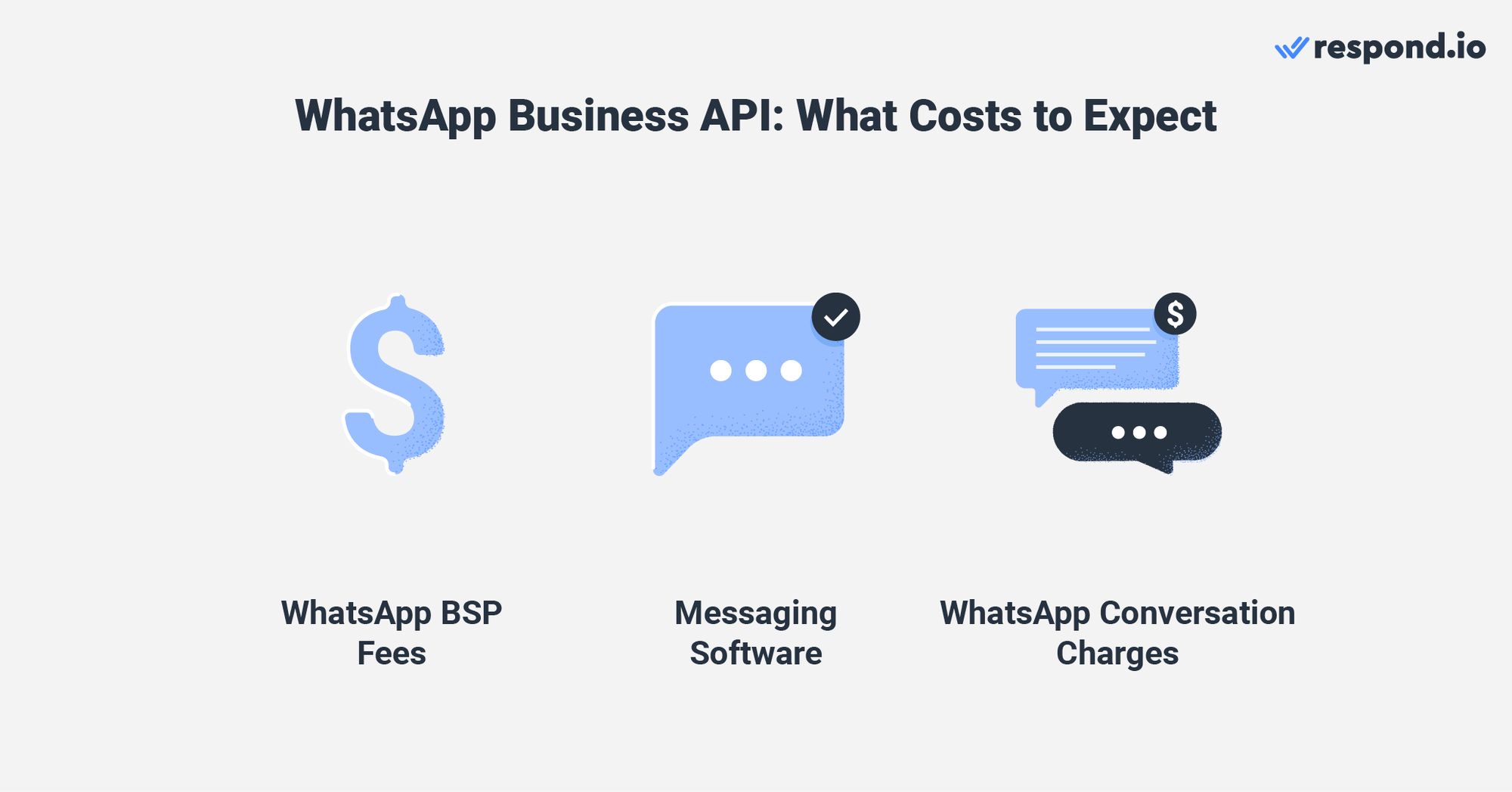
Finally, Meta charges per-message fees for outbound messages that vary by message type and country. We'll get into the details later.
To summarize, the WhatsApp Business API has three costs associated with it:
BSP fees
Messaging software costs
WhatsApp per-message charges
We’ll start by breaking down the WhatsApp per-message charges.
WhatsApp Business API Pricing in 2026: What It Costs and How It Works
As of July 1, 2025, WhatsApp Business Platform adopted a simpler, message-based pricing model that replaces the previous conversation-based system. While the 24-hour customer service window still plays an important role, the way businesses are charged has changed — and in many ways, it’s now more flexible and cost-efficient.
Here’s everything you need to know about the current WhatsApp pricing structure.
User-Initiated Messages (Service Conversations)
When a customer messages you first, this opens a 24-hour customer service window to reply freely without paying for every message — as long as you're using free-form text or utility message templates.
Good news: Utility templates sent during this 24-hour window are completely free, but not marketing or authentication templates (more about this later). This makes it easier and cheaper to handle support and order updates without worrying about rising costs.
Business-Initiated Messages (Template-Based Pricing)
If you want to message a customer after the 24-hour window ends, you'll need to send a pre-approved template message. There are three template categories:
Utility – for things like receipts, order confirmations, and reminders
Authentication – for one-time passcodes or verification
Marketing – for promotions, announcements, and special offers
Templates can include text, media headers, personalized placeholders, Quick Reply buttons, and Call-to-Action buttons to encourage user interaction.
How Template Category Affects Costs
The type of template you use determines the charge. If you send multiple templates from different categories (e.g., one utility and one marketing message), you’ll be charged separately for each. However, sending multiple messages from the same category won’t incur extra charges for that category within the same conversation.
Templates with unclear content or mixed purposes will be classified as marketing, which is typically the most expensive category.
How Phone Country Code Affects Costs
WhatsApp sets its rates based on the customer's phone number country code. That means pricing will vary depending on the user’s location, so be sure to check the latest country-specific pricing for accurate cost estimates.
Note that as of January 1, 2026, some rate changes went into effect, notably:
Marketing template message fees were lowered for France and Egypt, increased for India.
Utility and authentication template message fees were lowered for North America.
Also in 2026, Meta fees can be paid in 16 countries' local currencies rather than in US dollars, starting with Mexico on January 1, with other currencies available later in the year.
Save Costs with Free Entry Points
Conversations are free when customers initiate them via click to WhatsApp ads or Facebook Page call-to-action buttons. Additionally, the 24-hour customer service window will be extended to 72 hours when customers message you through these free entry points.
During this messaging window, all messages sent are free, including WhatsApp template messages.
Wait, There’s More: What’s the Pricing of WhatsApp Business Calls?
WhatsApp Business Calling API allows businesses to make calls using WhatsApp API. Respond.io is one of the few selected BSPs with access to this game-changing feature. Here are the basics to get you started.
Pricing Details
Outgoing call rates are based on:
Recipient’s country code.
Call duration: Charged in 6-second increments, rounded up.
Monthly volume: The more calls you make to a specific country, the lower your rate. Tiers reset every month.
Key Features and Limitations
WhatsApp Business API supports both inbound (user-initiated) and outbound (business-initiated) calls.
Inbound Calls: These are initiated by users to the business and are cost-free.
Outbound Calls: These require prior user permission. You’re billed only when the customer answers the call — initiating a call, ringing and unanswered calls don’t incur any charges.
Customer Service Window: A 24-hour customer service window is opened or refreshed when a user messages, calls, or accepts a call from your business. During this period, you can send free-form messages and utility templates at no cost.
You can visit our WhatsApp Pricing Calculator to explore messaging and calls costs and get your questions answered. With WhatsApp pricing made clear, it’s time to talk about the costs you will face from your BSP of choice.
Turn conversations into customers with respond.io's official WhatsApp API ✨
Manage WhatsApp calls and chats in one place!
WhatsApp Business Pricing by Partner
As mentioned earlier, the charges BSPs impose vary. A majority of them impose additional fees on top of the WhatsApp conversation charges like markups per message or setup fees. While costs differ from one BSP to another, we’ll cover some of the main BSPs in the market and their pricing models.
Sleekflow WhatsApp API Pricing: WhatsApp Account
Some businesses need to operate multiple WhatsApp accounts—whether to support different branches worldwide, serve distinct teams, or work around the limitations of a single account. If that’s your case, keep in mind that some BSPs, like SleekFlow, charge extra for each connected WhatsApp number.
Specifically, SleekFlow charges US$15 per month per WhatsApp Business phone number.
Wati WhatsApp API Pricing: Markup per message
Many BSPs impose markups on messages that you send and deliver on WhatsApp and Wati is one of them. It charges an additional 20% per message fee on top of Meta's charges.
MessageBird WhatsApp API Pricing: Markup per Message
MessageBird is another one that offers WhatsApp API access while adding its own message fees on top of the WhatsApp per-message charges.
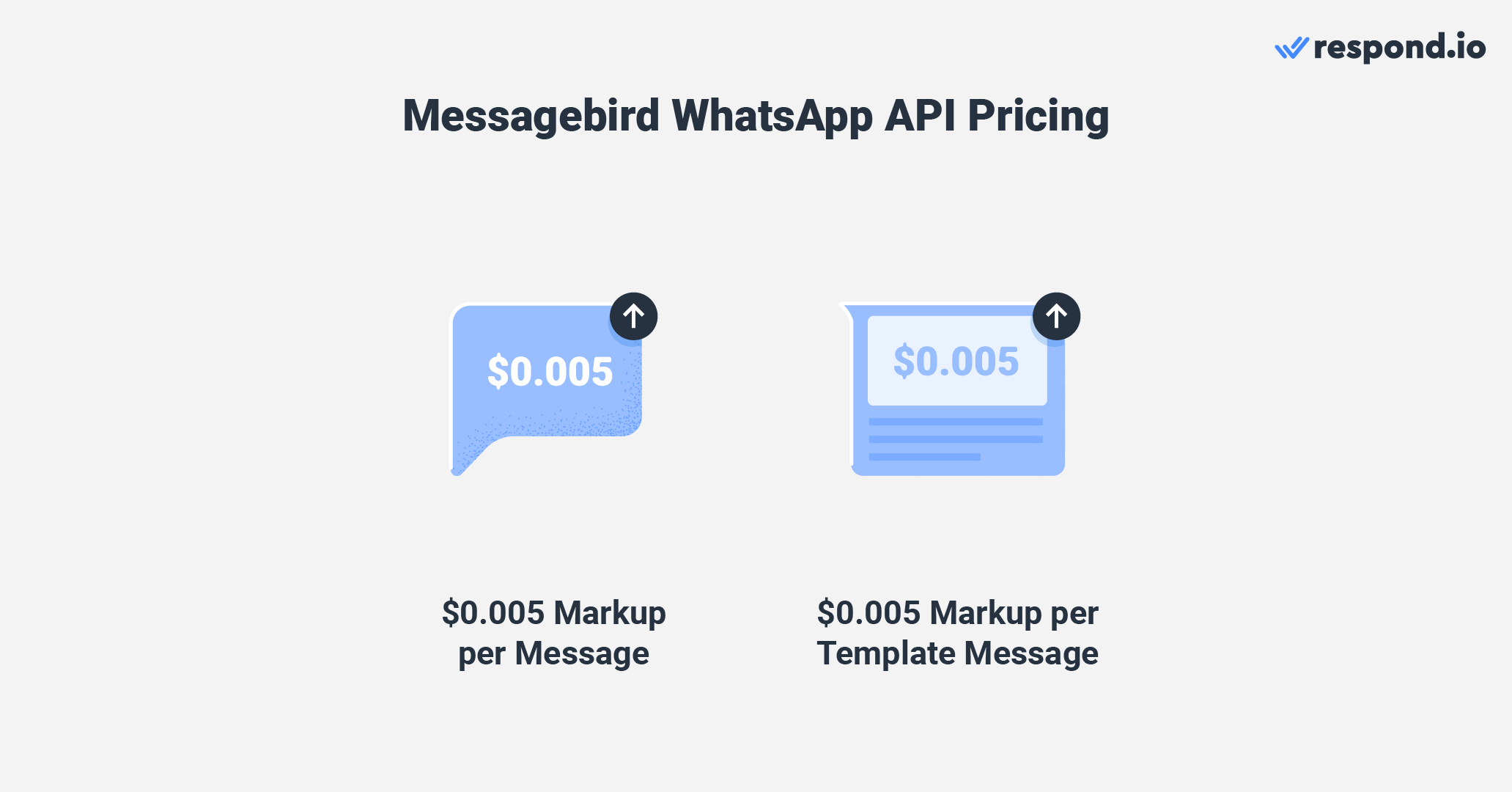
While WhatsApp conversation charges vary by country, MessageBird adds a $0.005 markup per session message sent by the business. There is also a $0.005 markup per template message, on top of the WhatsApp charges.
Twilio WhatsApp API Pricing: Per-Message
Twilio kept the per-message pricing model after the WhatsApp Business pricing changes. In their own words, “Pay-as-you-go pricing makes sure you only pay for what you use”.
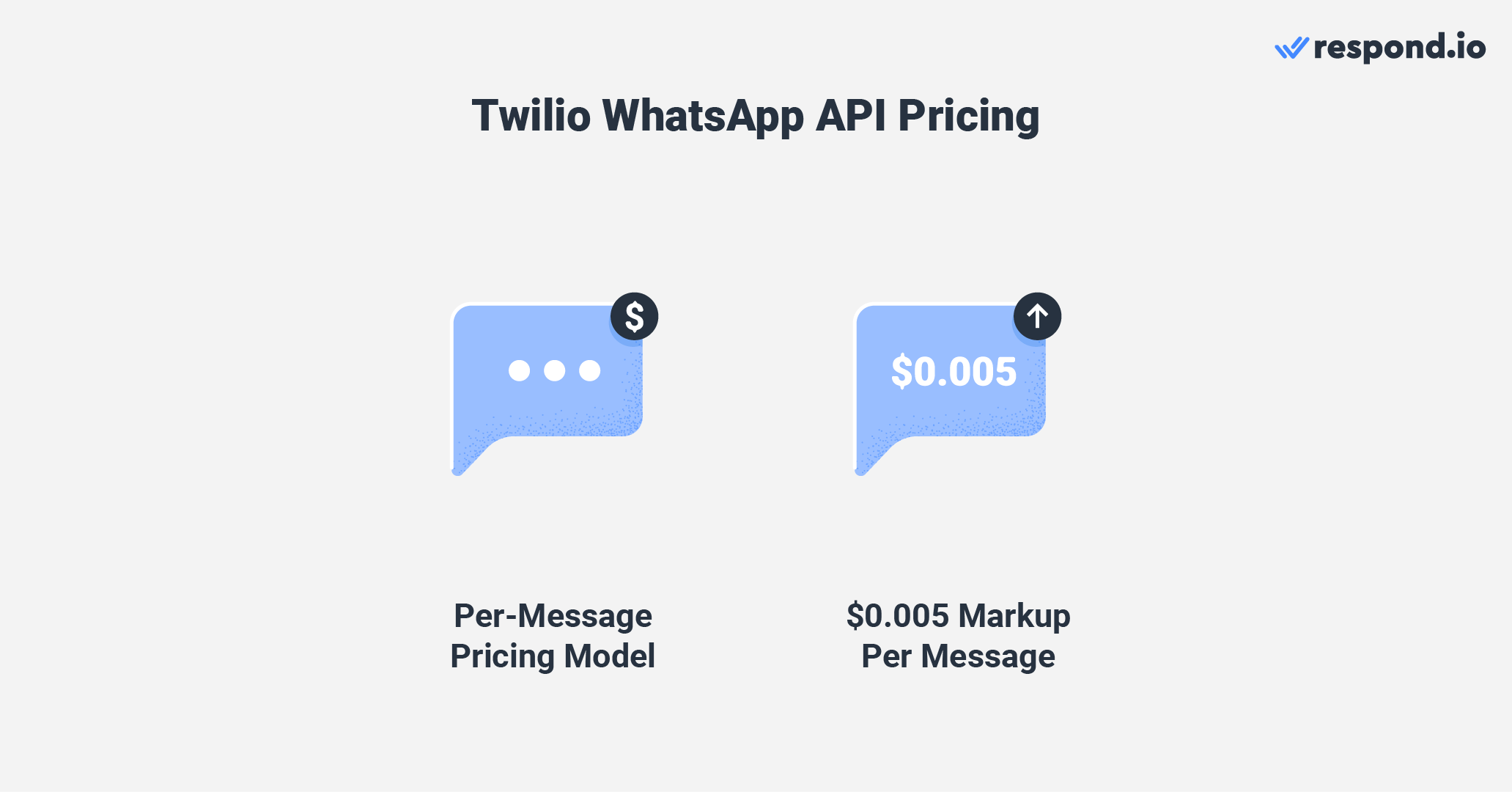
On top of WhatsApp charges, Twilio charges a $0.005 flat fee per message sent and also per message received. This markup applies to both business-initiated conversations and service conversations.
Respond.io WhatsApp Business API: Free WhatsApp API Access
Respond.io is a recognized WhatsApp Business Solution Provider (BSP) and customer conversation management software. It allows you to get free WhatsApp API access, manage your WhatsApp Business Account and receive messages in an omnichannel inbox.
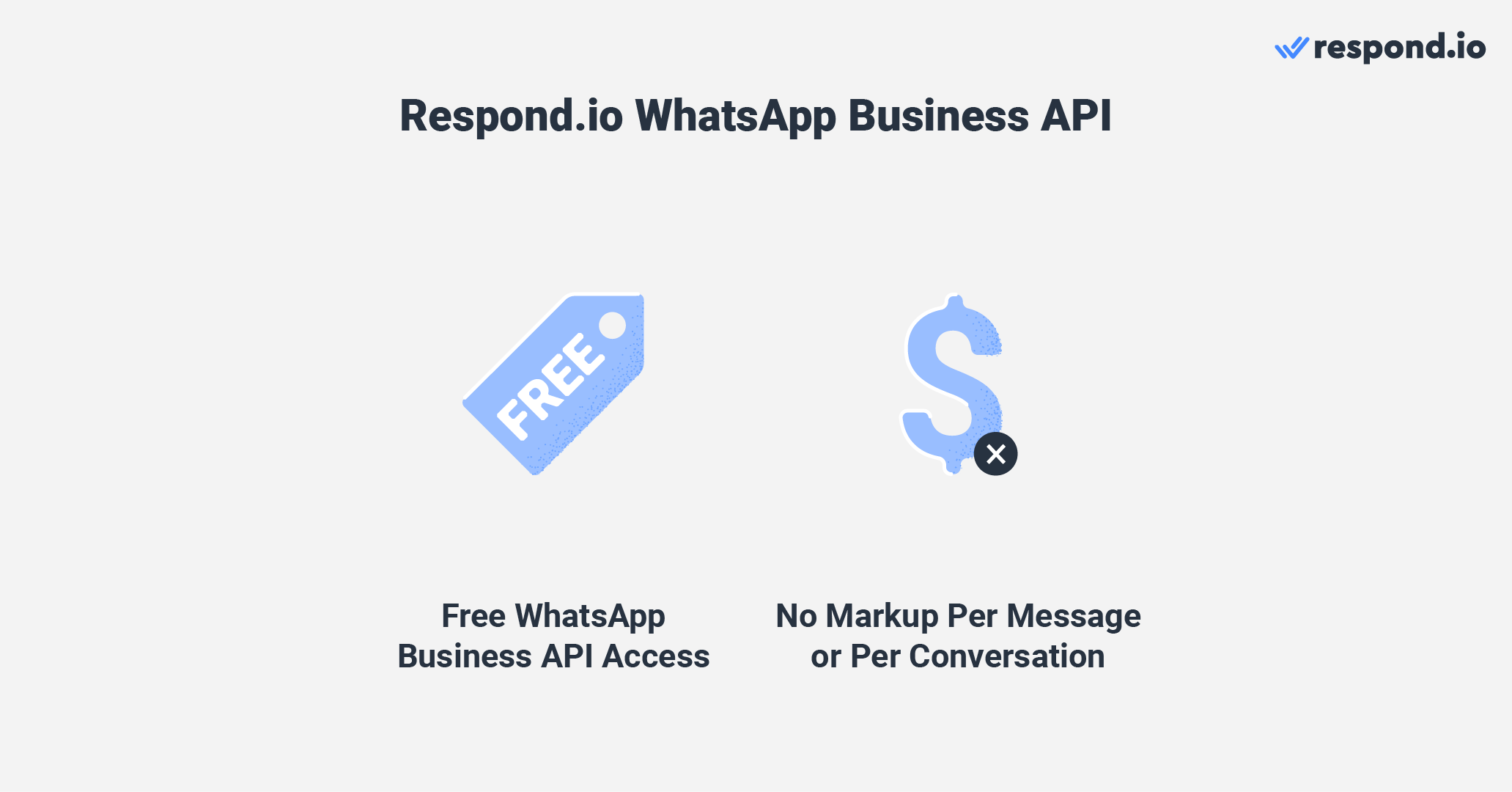
With respond.io, businesses only need to pay WhatsApp per-message charges that are made compulsory by WhatsApp. It does not impose any additional setup or per-message fees.
If you’re looking for a BSP that is also a messaging software provider, respond.io is your best bet. Now that you understand the pricing plans offered by popular WhatsApp BSPs, we’ll look at the most common business use cases and how the current WhatsApp Business pricing model affects them.
WhatsApp Business API Pricing by Use Case
Companies often have different teams messaging customers via WhatsApp API and these teams have different messaging habits.
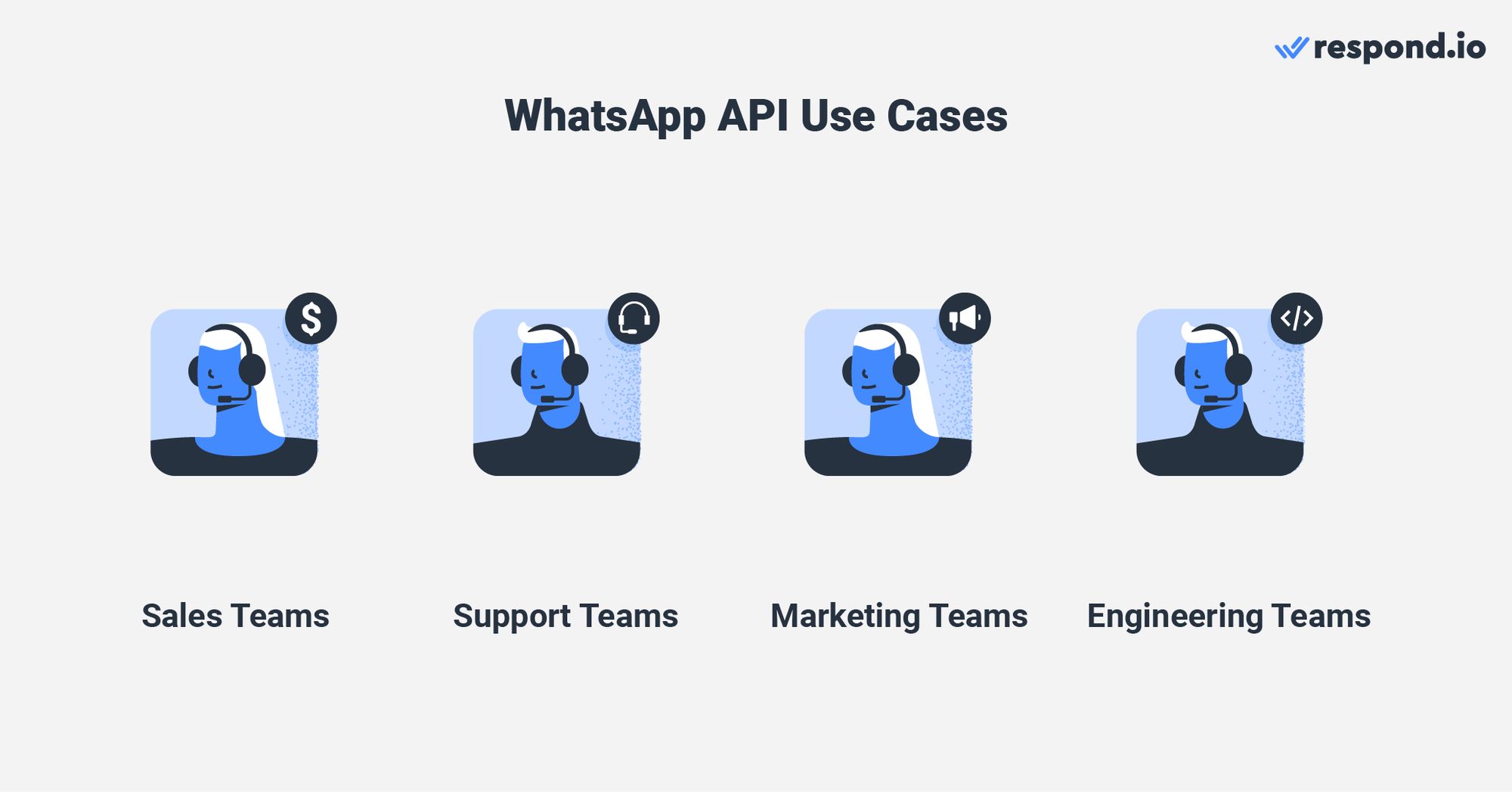
In this section, we’ll discuss what costs to expect when using WhatsApp API for sales, support, marketing and engineering.
WhatsApp Pricing for Sales Teams
Sales Teams typically initiate conversations with leads, incurring higher costs. For sales teams with low sales volume but high profit margins per sale, choosing a MAC or monthly plan can be cost-effective, as they often engage in fewer but more profitable conversations.
WhatsApp Pricing for Support Teams
Support Teams primarily respond to inbound inquiries. WhatsApp only charges for one message in a service conversation if it's replied to within 24 hours, making it more cost-effective for support teams.
However, extra charges apply for business messages extending beyond this window, and support teams must take care to avoid unnecessary charges for spam or irrelevant messages.
WhatsApp Pricing for Marketing Teams
For teams interested in WhatsApp marketing to send promotional messages, each counts as a business-initiated marketing message. This can be costly, especially if you send WhatsApp bulk messages, so it's advisable to select a BSP that doesn't charge a markup fee per message. It's important to adhere to WhatsApp's Business Policy to avoid misuse for spam.
Also consider integrating a WhatsApp CRM to further enhance your sales and marketing operations with WhatsApp.
WhatsApp Pricing for Engineers
Operational technical implementors (engineering teams) send transactional notifications like payment confirmations or password resets, categorized as business-initiated messages. Choosing BSPs without additional message costs is recommended to minimize expenses.
In general, transactional notifications are business-initiated, as they are not sent in response to a customer’s message. Business-initiated conversations are more expensive, so BSPs with additional message costs should be avoided.
Now that you understand everything you need about WhatsApp API pricing and the costs associated with it, it’s time to choose the right BSP for your business needs.
WhatsApp API Pricing: Choosing The Right BSP
As a business, paying per-message charges to WhatsApp to chat with customers is inevitable. However, you can avoid additional fees imposed by some WhatsApp BSPs. Unlike other providers, respond.io does not charge any setup fees, hosting fees or markup per message or conversation.
As you’d expect, respond.io supports all core WhatsApp API features like broadcasts to large audiences and interactive messages. But it also goes further with AI Agents — fully autonomous assistants that can respond to inbound WhatsApp calls, qualify leads, update customer details, generate conversation summaries and seamlessly escalate to humans when needed.
Plus, as a recognized Meta Business Partner, respond.io has undergone Meta's assessment for its proficiency in Meta products such as WhatsApp, Facebook Messenger, and Instagram DM. This affiliation comes with several advantages, including enhanced support from Meta, contributing to an elevated level of service for respond.io users.
If you're looking for a WhatsApp BSP that also offers AI-powered conversation management software, sign up for respond.io and get free WhatsApp API access.
Turn conversations into customers with respond.io's official WhatsApp API ✨
Manage WhatsApp calls and chats in one place!
FAQ and Troubleshooting
Is WhatsApp API free?
No. Using WhatsApp Business API involves the following costs:
Messaging software costs
WhatsApp conversation charges
Business Solution Provider fees
What is the WhatsApp Cloud API pricing?
Applying for WhatsApp Cloud API doesn’t cost money. This is important to know, as some BSPs could charge you an unnecessary fee for the application process. However, you’ll still need to pay the WhatsApp conversation charges and messaging software costs to message customers.
Is WhatsApp API worth the cost for my business?
It depends on the size and nature of your business. Many medium to large businesses have seen significant ROI from using WhatsApp API, for example, Automax saw 42.5x ROI from WhatsApp broadcasts in just one month! However, businesses that send small volumes of messages and can manage conversations with a small team without automation often find that BSP costs and Meta’s per-message fees and additional restrictions are not worth the investment.
When are WhatsApp fees applied?
WhatsApp charges fees based on conversation-based pricing. Fees apply when a business initiates a conversation with a customer or responds to a customer's message beyond a 24-hour window. The first 1,000 conversations each month are free.
Further Reading
That’s all you need to know about the WhatsApp API cost for businesses. If found this reading interesting, check out the following articles:






































 Electronics
Electronics Fashion & Apparel
Fashion & Apparel Furniture
Furniture Jewelry and Watches
Jewelry and Watches
 Afterschool Activities
Afterschool Activities Sport & Fitness
Sport & Fitness
 Beauty Center
Beauty Center Dental Clinic
Dental Clinic Medical Clinic
Medical Clinic
 Home Cleaning & Maid Services
Home Cleaning & Maid Services Photography & Videography
Photography & Videography
 Car Dealership
Car Dealership
 Travel Agency & Tour Operator
Travel Agency & Tour Operator




